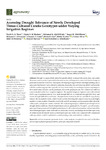Mostrar o rexistro simple do ítem
Assessing Drought Tolerance of Newly Developed Tissue-Cultured Canola Genotypes under Varying Irrigation Regimes
| dc.contributor.author | Morsi, Nahid A. A. | |
| dc.contributor.author | Hashem, Omnia S. M. | |
| dc.contributor.author | Abd El-hady, Mohamed Ahmed | |
| dc.contributor.author | Abd-Elkrem, Yasser M. | |
| dc.contributor.author | Eltemsah, Mohammed | |
| dc.contributor.author | Galal, Elhussin G. | |
| dc.contributor.author | Gad, Khaled I. | |
| dc.contributor.author | Boudiar, Ridha | |
| dc.contributor.author | Silvar, Cristina | |
| dc.contributor.author | El-Hendawy, Salah | |
| dc.contributor.author | Mansour, Elsayed | |
| dc.contributor.author | Abdelkader, Mohamed A. | |
| dc.date.accessioned | 2023-06-26T15:28:33Z | |
| dc.date.available | 2023-06-26T15:28:33Z | |
| dc.date.issued | 2023-03-13 | |
| dc.identifier.citation | Morsi, N.A.A.; Hashem, O.S.M.; El-Hady, M.A.A.; Abd-Elkrem, Y.M.; El-temsah, M.E.; Galal, E.G.; Gad, K.I.; Boudiar, R.; Silvar, C.; El-Hendawy, S.; et al. Assessing Drought Tolerance of Newly Developed Tissue-Cultured Canola Genotypes under Varying Irrigation Regimes. Agronomy 2023, 13, 836. https://doi.org/10.3390/agronomy13030836 | es_ES |
| dc.identifier.issn | 2073-4395 | |
| dc.identifier.uri | http://hdl.handle.net/2183/33249 | |
| dc.description | This article belongs to the Special Issue Crop Tolerance under Biotic and Abiotic Stresses | es_ES |
| dc.description.abstract | [Abstract] Drought is a major abiotic stress that greatly affects canola growth, production, and quality. Moreover, water scarcity is projected to be more severe and frequent as a result of climate change, in particular in arid environments. Thereupon, developing drought-tolerant and high-yielding canola genotypes has become more critical to sustaining its production and ensuring global food security with the continuing population growth. In the present study, ten canola genotypes comprising six developed tissue-cultured canola genotypes, two exotic genotypes, and two commercial cultivars were evaluated under four irrigation regimes. The applied irrigation regimes were well-watered (100% crop evapotranspiration, ETc), mild drought (80% ETc), moderate drought (60% ETc), and severe drought (40% ETc) conditions. Drought-stress treatments (80, 60, and 40% ETc) gradually reduced the chlorophyll content, relative water content, flowering time, days to maturity, plant height, number of pods, number of branches, seed yield, and oil percentage, and increased proline, phenolic, anthocyanin, and glycine betaine contents. The evaluated genotypes exhibited varied responses to drought-stress conditions. The developed tissue-cultured genotypes T2, T3, and T1, as well as exotic genotype Torpe, possessed the highest performance in all evaluated parameters and surpassed the other tested genotypes under water-deficit conditions. Overall, our findings elicited the superiority of certain newly developed tissue-cultured genotypes and exotic ones compared with commercial cultivars, which could be exploited in canola breeding under water-deficit conditions. | es_ES |
| dc.description.sponsorship | This research was funded by the Researchers Supporting Project number (RSPD-2023R730), King Saud University, Riyadh, Saudi Arabia | es_ES |
| dc.description.sponsorship | King Saud University (Riad, Arabia Saudí); RSPD-2023R730 | es_ES |
| dc.language.iso | eng | es_ES |
| dc.publisher | MDPI | es_ES |
| dc.relation.uri | https://doi.org/10.3390/agronomy13030836 | es_ES |
| dc.rights | Atribución 4.0 Internacional | es_ES |
| dc.rights.uri | http://creativecommons.org/licenses/by/4.0/ | * |
| dc.subject | Arid environment | es_ES |
| dc.subject | Agronomic traits | es_ES |
| dc.subject | Cluster analysis | es_ES |
| dc.subject | Drought tolerance indices | es_ES |
| dc.subject | Mediterranean region | es_ES |
| dc.subject | Physiological parameters | es_ES |
| dc.subject | Principal component analysis | es_ES |
| dc.title | Assessing Drought Tolerance of Newly Developed Tissue-Cultured Canola Genotypes under Varying Irrigation Regimes | es_ES |
| dc.type | info:eu-repo/semantics/article | es_ES |
| dc.rights.access | info:eu-repo/semantics/openAccess | es_ES |
| UDC.journalTitle | Agronomy | es_ES |
| UDC.volume | 13 (2023) | es_ES |
| UDC.issue | 3 | es_ES |
| UDC.startPage | 836 | es_ES |
| dc.identifier.doi | 10.3390/agronomy13030836 |
Ficheiros no ítem
Este ítem aparece na(s) seguinte(s) colección(s)
-
GI-GIBE - Artigos [75]






